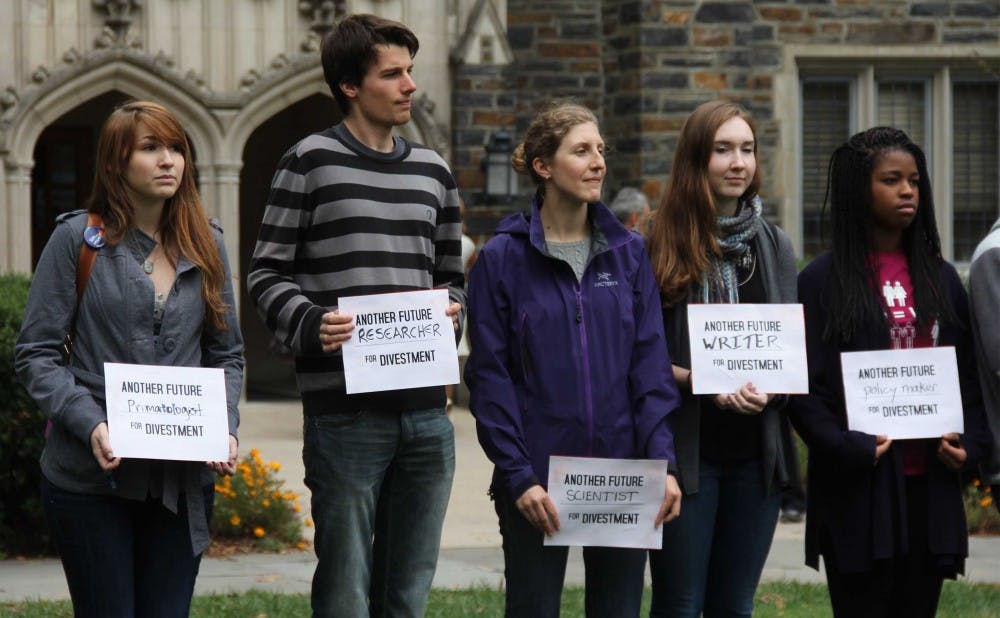Although their proposal to divest the University endowment from fossil fuels was rejected, Divest Duke has not slowed its efforts.
“We’re reevaluating the ways in which we lobby,” said Divest Duke press coordinator Houston Warren, a freshman. “We showed a lot of student support, got 3,500 signatures, hundreds of sign-ons by professors and a lot of alumni to call in, but within administration you have to talk to the right people and find the right friends, so I think that’s something we’re going to target, in addition to continuing to show a groundswell of grassroots support.”
Divest Duke is the student group that urged the University to remove its investments in the top-200 publicly-traded companies that hold a majority of the world's coal, oil and natural gas resources.
In January Duke administrators announced in January that they would not support divestment after the Advisory Committee on Investment Responsibility unanimously recommended against it in a letter to President Richard Brodhead dated Nov. 24, 2014.

ACIR—a group comprising faculty, students and alumni designed to assess the social impact of Duke's investment—rejected the proposal due to a lack of campus conversation about divestment, uncertainty about its impact and belief that other University actions will have a larger impact on climate change.
Divest Duke argues that fossil fuels “cause substantial social harm” through their effects on climate change. The campaign parallels several other movements at institutions around the country.
Harvard University's board of trustees similarly rejected a student-led proposal to divest from fossil fuels in 2013—pointing to the fact that other investors would quickly buy up any shares sold by Harvard after divestment and that endowments are a resource, rather than a means to enact social change.
Stanford University's divestment movement, on the other hand, has not succeeded in convincing the university to completely divest from fossil fuels, but, in 2014, it did inspire the board of trustees to sell all shares in coal mining and burning companies.
However, Divest Duke does not plan to step down its demands regardless of the precedent set by Duke administration and other universities.
“Some divestment movements have downgraded their proposals, so they’ll say instead of all fossil fuels they want [their endowments] to divest from coal, which is a lot simpler and a much smaller part of their portfolio,” Warren said. “We think fossil fuels is such a different case than coal because it’s a larger industry, so we’re not backing down and realize that try, try again is the way most activist movements succeed.”
Increasingly, other student groups on campuses across the nation are turning to divestment as a way to impart social change through various causes.
A student-led divestment group at Northwestern University, for example, facilitated a student government resolution opposing university investments in companies involved in the Israeli-Palestinian conflict. Northwestern administration has yet to address the resolution.
Other Duke-specific examples of divestment include the University’s decision to separate itself from other controversial investments—including conflict minerals in 2012 and South African companies during the Apartheid era in the late 1980s.
ACIR Chair James Cox, Brainerd Currie Professor of Law, explained that divestment movements are bound to arise both at Duke and other universities due to the inherent diversity of the campuses and that individual preferences dictate personal divestments from various corporations or industries.
“One can think about a lot of issues on a campus as diverse involved as Duke is,” Cox said. “In my own personal portfolio there are companies I don’t invest in because I just don’t believe in the philosophy of the company, be it how they treat workers or their competitors, quite frankly, so I don’t buy products from them and I don’t own stock in them. I’m sure I’m not alone, but we all disagree about what that company is, so there are a lot of different issues [out there].”
Cox emphasized that the decisions consumers and investors face in today’s world are rarely straightforward when it comes to the practices of corporations.
Get The Chronicle straight to your inbox
Signup for our weekly newsletter. Cancel at any time.

